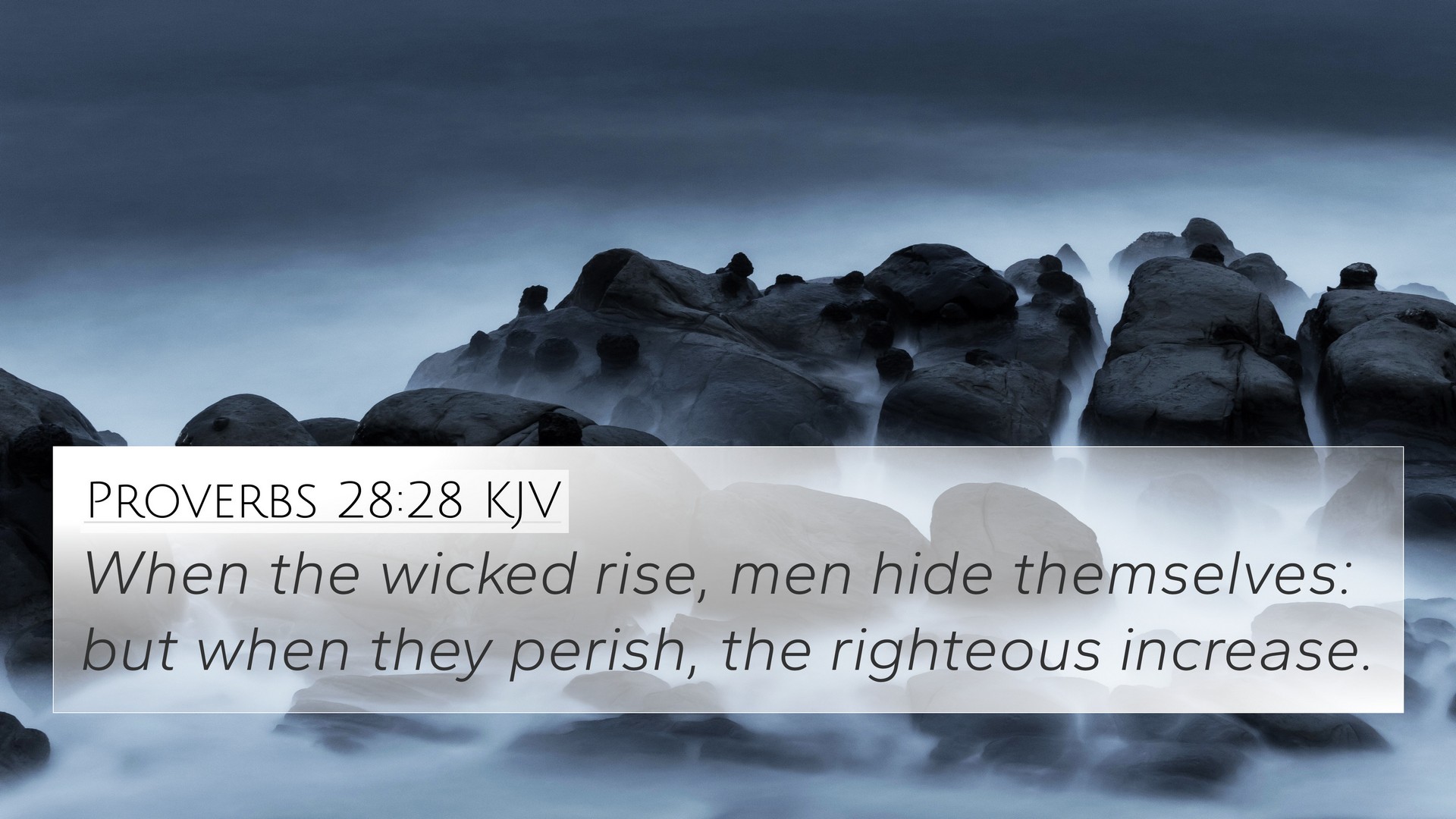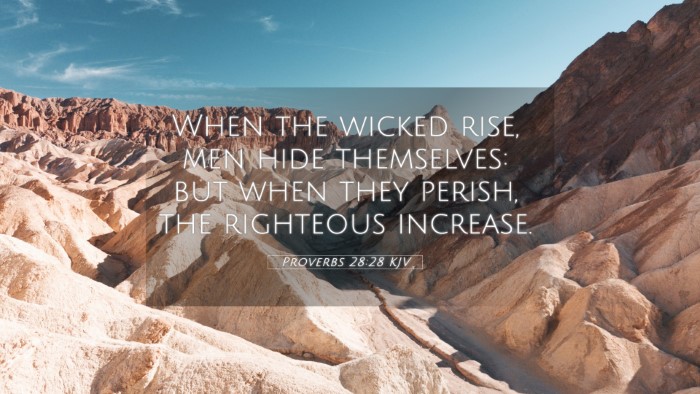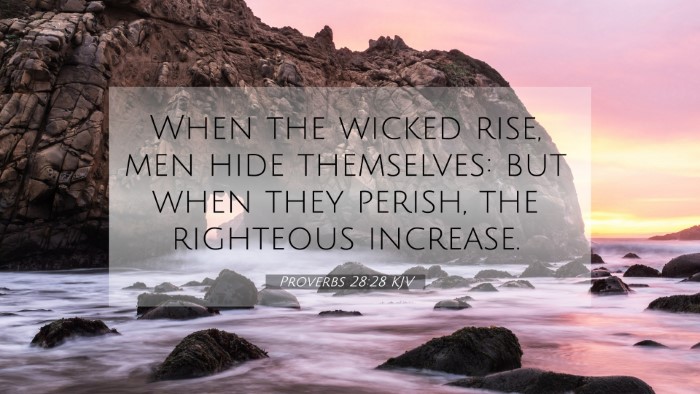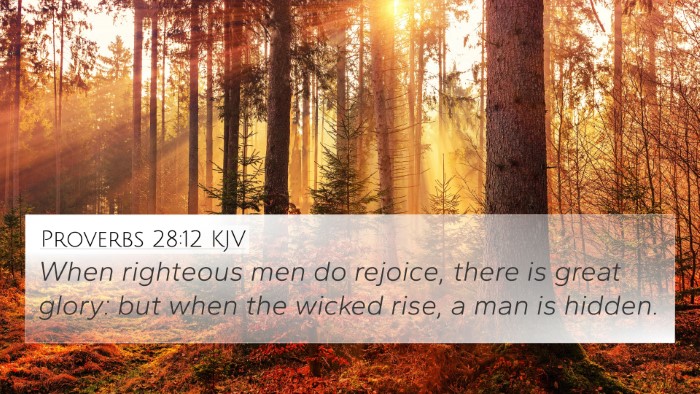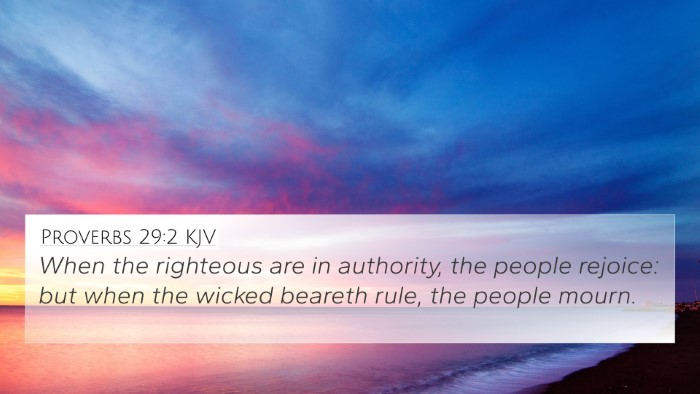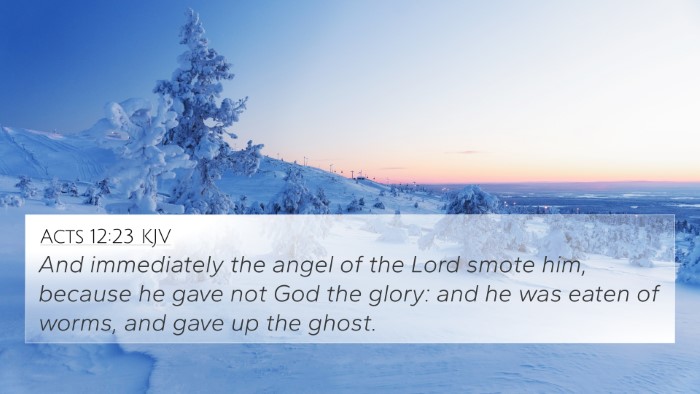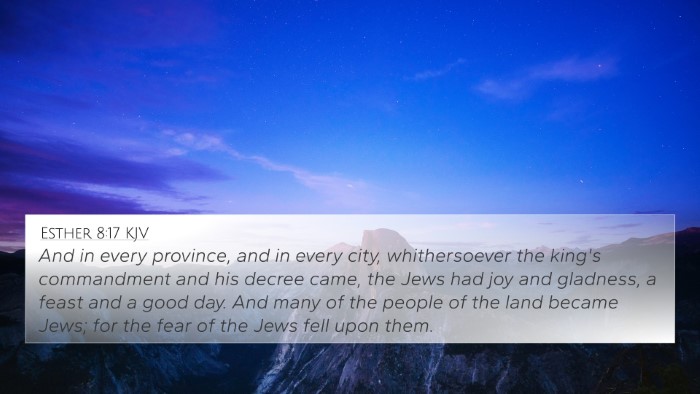Understanding Proverbs 28:28
Proverbs 28:28 states, "When the wicked rise, men hide themselves; but when they perish, the righteous increase." This verse signifies the consequences of wickedness and righteousness in society, emphasizing a theme present throughout the Book of Proverbs and the wider context of Biblical teachings.
Meaning and Interpretation
The central idea in this verse is the contrast between wickedness and righteousness and their effects on society. As noted by Matthew Henry, the rising of the wicked leads to fear and concealment, causing people to hide due to the threat that wicked individuals pose. In contrast, the fall or 'perishing' of these wicked ones results in the flourishing of the righteous. This transformation signifies a society that benefits from the removal of evil influences.
Adam Clarke further elaborates on the idea of social dynamics, suggesting that the 'rising' of wickedness is often followed by trepidation among the populace, while the demise of the wicked opens opportunities for the righteous to thrive. The faithful gain courage and space to live righteously as evil influences diminish.
According to Albert Barnes, this verse also serves as a reminder of God's ultimate justice. Although it may seem that the wicked prosper for a time, their eventual downfall is certain, allowing the righteous to prevail. Thus, it conveys a message of hope and assurance for the faithful.
Related Bible Cross-References
- Psalms 37:10-11: "For yet a little while, and the wicked shall not be; indeed, you will look carefully for his place, but it shall be no more. But the meek shall inherit the earth, and shall delight themselves in the abundance of peace."
- Psalms 75:7: "But God is the judge: He puts down one, and exalts another."
- Proverbs 11:10: "When it goes well with the righteous, the city rejoices; and when the wicked perish, there is jubilation."
- Isaiah 57:1: "The righteous perishes, and no man takes it to heart; merciful men are taken away, while no one considers that the righteous is taken away from evil."
- Ecclesiastes 8:14: "There is a vanity which occurs on earth, that there are just men to whom it happens according to the work of the wicked; again, there are wicked men to whom it happens according to the work of the righteous. I said that this also is vanity."
- Matthew 13:30: "Let both grow together until the harvest, and at the time of harvest, I will say to the reapers, 'First gather together the tares and bind them in bundles to burn them, but gather the wheat into my barn.'
- 2 Thessalonians 1:6: "Since it is a righteous thing with God to repay with tribulation those who trouble you."
- Romans 6:21: "What fruit did you have then in the things of which you are now ashamed? For the end of those things is death."
- Job 4:8: "Even as I have seen, those who plow iniquity and sow trouble reap the same."
- Galatians 6:7: "Do not be deceived: God is not mocked; for whatever a man sows, that he will also reap."
Thematic Connections
This verse and its connected cross-references highlight several important themes:
- The justice of God: The consistent message across these passages is that God ultimately dispenses justice, rewarding righteousness and punishing wickedness.
- The fear of wickedness: The pervasive fear in societies dominated by wickedness is evident in various passages, reiterating the social impact of moral choices.
- The triumph of righteousness: The rise and reward of the righteous demonstrate a biblical theme that resonates throughout scripture, underscoring that righteousness will eventually prevail.
- The pursuit of peace: The inheritance of the earth by the meek, as seen in Psalms, indicates the blessings that come from righteous living and leads to communal peace.
Applying Proverbs 28:28 in Study
When studying this verse, the effective use of Bible cross-reference guides can enhance understanding. Here are some methods:
- Utilize a Bible concordance: Look up keywords such as "righteous" and "wicked" to find related verses that elaborate on these concepts.
- Cross-reference biblical texts: Compare the ideas of Proverbs 28:28 with similar verses in the Psalms, Ecclesiastes, and New Testament teachings.
- Engage in thematic Bible verse connections: Group verses that address justice, reward, and retribution to see the overarching biblical narrative.
- Explore inter-Biblical dialogue: Identify connections between Old and New Testament teachings about righteousness and judgment.
Conclusion
Proverbs 28:28 encapsulates profound biblical truths about the cyclical nature of righteousness and wickedness. It serves as a reminder of God's justice and encourages the faithful to remain steadfast amid adversity, knowing that righteousness prevails. By utilizing comprehensive Bible cross-reference materials, readers can dive deeper into connecting themes and enhance their understanding of scripture, reinforcing the belief that the righteous will flourish while the wicked will eventually meet their end.
